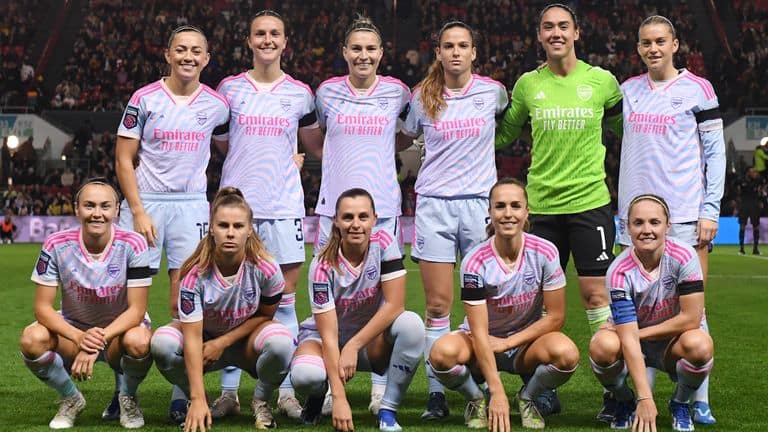Arsenal statement: “We acknowledge our current women’s first-team squad does not reflect the diversity that exists across the club and the communities we represent. Increasing participation among young women and girls from diverse backgrounds is a key priority for us”
Arsenal’s statement said: “We acknowledge our current women’s first-team squad does not reflect the diversity that exists across the club and the communities we represent.
“Increasing participation among young women and girls from diverse backgrounds is a key priority for us at academy level, with specific measures in place to improve pathways and accessibility.
“Across all our teams, including our men’s and women’s academies, we’re proud of our players from diverse backgrounds who have contributed to our history, success and culture.
The lack of diversity in the women’s squad is in contrast to the make-up of the Arsenal men’s squad with Bukayo Saka, Eddie Nketiah, William Saliba, Thomas Partey, Gabriel, Takehiro Tomiyasu and Gabriel Jesus some of the players at manager Mikel Arteta’s disposal.
Back in September 2002, the Gunners also became the first team in Premier League history to include nine Black players in a starting XI, with Patrick Vieira, Sol Campbell, Lauren, Ashley Cole, Kolo Toure, Gilberto Silva, Nwankwo Kanu, Thierry Henry and Sylvain Wiltord all included by then manager Arsene Wenger.
Please use Chrome browser for a more accessible video player
Arsenal women
Jen Beattie recognises the need for more representation within Arsenal’s first team, and hopes that change can be made at all levels of the game. Listen to the full episode of Three Players and a Podcast wherever you get your podcasts
Arsenal Women player Jen Beattie told the Three Players and a Podcast: “The club knows it’s not good enough not to have representation at the top level. The men’s team have that, a lot of men’s football has that. But in women’s football, it’s not good enough and it’s not good enough for us at the minute.
“You see the likes of Rach [Yankey] on the side of the Emirates, Anita Asante and other top players, who have been a huge part our history of Arsenal so to not have that at the minute is disappointing.
“But it has to happen at grassroots level. Our academy are making steps towards that, in terms of allowing coaches and buses to come from inner-city London up Hertfordshire to allow girls to train as part of the academy to make it more diverse, make it more inclusive and more accessible for everyone.
“But it has to happen at both levels and for me, representation is even more important at first-team level.”
Yankey added: “If you’re a young kid now, you’re able to switch on the TV, you’re able to look at magazines and you’re able to find information about footballers so you want to have a role model that looks like you and you can relate to in some sort of way.”
However, the lack of diversity is a microcosm of the wider issue within women’s football. Players from ethnically diverse backgrounds are often in the minority in elite squads and issues around access and opportunity are mitigating factors.
Arsenal women
Image: The Gunners say they will work to deliver ‘greater diversity’ as a ‘priority’
For example, all of England’s starting XI at Euro 2022 were white and only three (Nikita Parris, Jess Carter and Demi Stokes) in the squad were from mixed-heritage backgrounds.
At the 2023 World Cup, Carter and Lauren James were used regularly, but were the only ethnically diverse players on Sarina Wiegman’s squad.
Chelsea manager Emma Hayes has been among those to criticise the lack of diversity in the women’s game, calling it a “middle-class sport”.
“Women’s football is quite a middle-class sport in my opinion,” Hayes said. “In terms of the locations, the pedigree of player, they’re often coming from suburban belts around the training grounds.
Arsenal
Image: Arsenal became the first team in Premier League history to include nine Black players in a starting XI in 2002
“They’re not the Alex Scotts, the Rachel Yankeys, the Anita Asantes. They’re not coming to our facilities in the same way and you’ve got to ask yourself the question: why?
“Look at the number of footballers that came out of south-east London and into the England men’s team; an unbelievable number. Why aren’t they in the women’s side? I often ask that question [at Chelsea]. They’re all from Surrey. They’re the most talented kids in Surrey. But are they the most talented kids around? I beg to differ.
“Why aren’t we going into London? Why aren’t we hosting our academies right in the heart of London? Who in their ivory tower has been dreaming up this prawn sandwich girls football club?
“Girls don’t travel. Boys in the academy game either have parents who will take them somewhere or they’ll get on trains to do it.
England lift the European Championship trophy after beating Germany in the final at Wembley
Image: Only three of England’s Euro 2022-winning squad were from ethnically diverse backgrounds
“Families won’t let their girls go to games [by themselves]. It’s going to have to be parent-led and kids coming from the city, often their parents are working and might not have the same [opportunity].
“So our starting point should be…that if you want a diverse group involved with our game at an elite level then perhaps we should be travelling into the cities in a more profound way.
“But why are you going to do that if you don’t have player protection, if you’re investing into something where you could lose a player at any point? Both have to be supported.”




See More
Astro Cricket
Supersport Laliga
Supersport Football